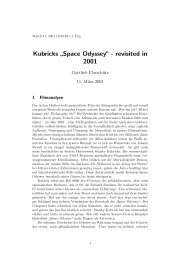Henry M. Taylor, 'Frames, Cons, and Double-Crosses - Cinetext
Henry M. Taylor, 'Frames, Cons, and Double-Crosses - Cinetext
Henry M. Taylor, 'Frames, Cons, and Double-Crosses - Cinetext
You also want an ePaper? Increase the reach of your titles
YUMPU automatically turns print PDFs into web optimized ePapers that Google loves.
within film that the ―truly‖ theatrical can fully emerge <strong>and</strong> express itself as supremely effective<br />
against the background of cinema's photographic realism, in other words, as fully self-conscious,<br />
self-reflexive ―theatre‖ ?<br />
Situated in his approach between realism <strong>and</strong> anti-naturalism, but without going to the ex-<br />
tremes of deliberate estrangement, David Mamet is widely recognized as one of the most brilliant<br />
<strong>and</strong> distinctive playwrights in America today. Winning the Pulitzer prize for his play Glengarry<br />
Glen Ross, which he also adapted for James Foley's screen version (1992), he has written numer-<br />
ous screenplays, including the court-room drama THE VERDICT (Sidney Lumet, 1982), the Al Ca-<br />
pone gangster epic THE UNTOUCHABLES (Brian De Palma, 1987), or the cynical political satire<br />
WAG THE DOG (Barry Levinson, 1997). Starting with HOUSE OF GAMES (1987), he has also<br />
scripted <strong>and</strong> directed numerous films of his own, including THINGS CHANGE (1988), HOMICIDE<br />
(1991), THE SPANISH PRISONER (1997), STATE AND MAIN (2000), HEIST (2001), <strong>and</strong> SPARTAN<br />
(2004). The latter body of work, as this essay aims to show, constitutes a genuinely theatrical ci-<br />
nema, in which a stage idiom of self-conscious role-playing, typically with streetwise argot <strong>and</strong><br />
slick one-liners, is looped back into a diegetic world full of role-playing, deception, <strong>and</strong> danger-<br />
ous games, <strong>and</strong> which in its reflexivity is exemplary of crucial postmodernist concerns.<br />
Mamet's formalist approach to acting<br />
Besides writing plays, screenplays, <strong>and</strong> works of fiction, Mamet has also outlined his ideas re-<br />
garding the work for stage <strong>and</strong> film in a number of nonfiction books; among these, we will look<br />
at some of his concepts put forward in On Directing Film (1991) <strong>and</strong> True <strong>and</strong> False: Heresy <strong>and</strong><br />
Common Sense for the Actor (1997). From these two texts, we can outline a number of Mamet's<br />
basic artistic tenets, work procedures, <strong>and</strong> convictions. A word of caution is appropriate, howev-<br />
er. While repeatedly claiming the universal validity of his views on what acting is <strong>and</strong> should be,<br />
<strong>and</strong> how plays <strong>and</strong> films really work <strong>and</strong> affect their respective audiences, Mamet's beliefs are far<br />
too dogmatic to be taken at face value; he aspires to a universality which is, in effect, unwar-<br />
ranted. What his ideas do illuminate, though, is the poetics of his own work. The reason for this<br />
is, simply, that as normative manifestoes they are not so much metatextual theories of acting <strong>and</strong><br />
directing, but themselves, in their mantra-like repetition of crucial axioms, with sentences ham-<br />
3



